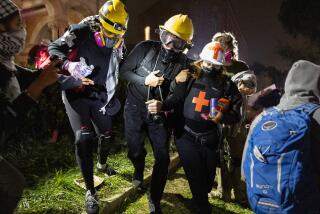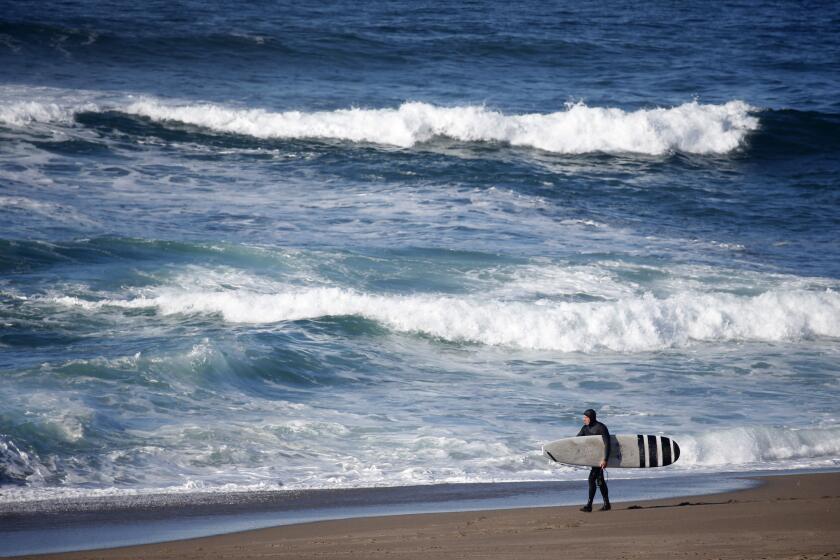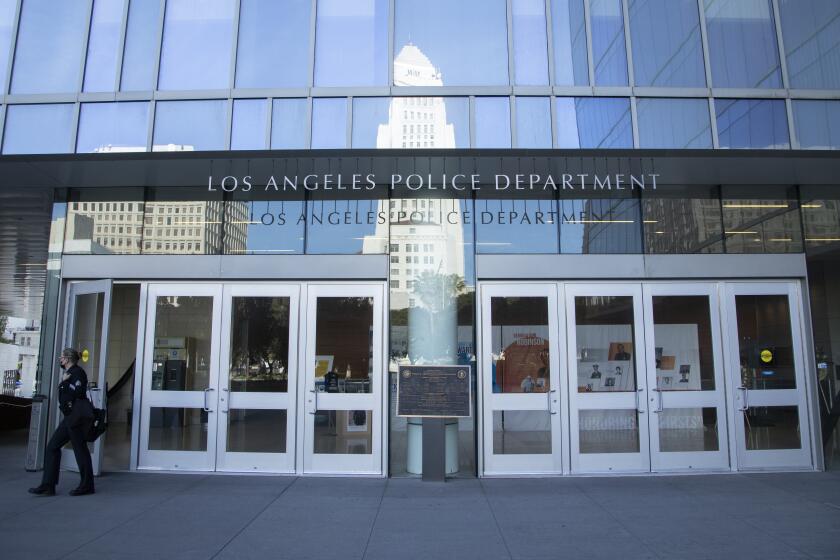Breaking Law Is No Walk in Park
The evening had begun so well. After wine and dinner at the elegant Ahwahnee Hotel last year, Australian tourists Margaret and Andre Vischer stepped into the frigid High Sierra night and into their rental car.
As they drove through the first dark intersection, neither of them noticed the park ranger’s vehicle. Andre, 58, recalled seeing a stop sign and lightly touching the brakes but not coming to a full stop.
After they were pulled over by the rangers, Vischer said he told them about the bottle of wine he and his wife had shared during their four-hour dinner. Both Vischers were given Breathalyzer tests. Andre’s blood alcohol registered .08, the minimum at which a person is considered legally drunk. Margaret tested at .06.
Andre was frisked, handcuffed, read his rights and taken away by two rangers. Another ranger drove the couple’s rental car while Margaret remained at the side of the road where a male ranger frisked her, handcuffed her and took her to Yosemite’s small jail to spend the night. There, she was fingerprinted, photographed, questioned and told to strip, shower and put on an orange jumpsuit.
When Margaret asked why she was being jailed even though her blood-alcohol level was under the legal limit and she was not driving, she said rangers told her they considered her a danger to herself and others. The next day she was released without being charged.
The couple spent Margaret’s 60th birthday a few days later at the park’s federal courthouse, where Andre pleaded guilty to driving under the influence and paid a $2,500 fine.
“The whole thing was totally intimidating and humiliating and totally unnecessary,” Margaret Vischer said in a recent telephone interview from the couple’s home in Sydney.
Cam Sholly, Yosemite’s deputy chief ranger, said the decision to arrest Margaret Vischer was discretionary. “This was a fine line between taking someone into custody for their own safety and releasing someone whose judgment is impaired to a degree that they could be a danger to themselves,” he said.
But Margaret Vischer’s story has a familiar ring to other visitors, employees and defense attorneys with similar accounts of alleged overzealous policing in a place where people come to relax and expect to be treated like guests. Most of the people who have questioned the conduct of park rangers acknowledged doing something out of line. Nonetheless, they contend that the treatment by park rangers was out of proportion to the minor infractions they committed and out of place in a national park.
Beth Shilliday, a 35-year-old assignment editor for KTLA-TV Channel 5 in Los Angeles, said she was treated for a concussion and bruises after rangers threw her to the ground while arresting her on suspicion of drunk driving and possession of a small amount of marijuana. Her car and others were stopped during a search for a missing child in August.
Park officials told The Times, which like KTLA-TV is owned by the Tribune Co., that Shilliday was intoxicated and uncooperative, and whatever injuries she suffered she caused herself. Shilliday has pleaded not guilty and her case is pending in Yosemite’s federal court. Meanwhile, the park has launched an internal investigation into the rangers’ behavior.
Leah Sesto, an 18-year-old clerk in the park in 2000, said she was dragged out of bed by rangers and arrested on suspicion of being drunk a few hours after friends had escorted her to her room. “It was the first time I’d ever had anything to drink,” said Sesto, who described herself as “a goody-goody church kid.”
She pleaded guilty to being under the influence of alcohol.
Interviewed at the park, Yosemite Supt. Mike Tollefson vigorously defended his rangers, saying their daily unheralded efforts to save lives and keep the park and visitors safe far outstrip occasional judgment errors.
“I would adamantly disagree that there is a zero tolerance policy in this park,” Tollefson said. “We certainly have problems periodically. Of the complaints we get, law enforcement is the minority, but we take those the most seriously.”
Despite its bucolic setting amid towering granite walls and waterfalls, Yosemite National Park is subject to the same social ills that police contend with elsewhere. In the mid-1980s, a report from the Interior Department’s inspector general found a prostitution ring operating at the Ahwahnee Hotel and estimated that 85% of the park’s commercial workforce used illegal drugs.
Five years ago, three tourists and a nature guide were slain just outside the park. In October, a manhunt for another multiple killer led to a remote section of the park where the suspect started a 2,000-acre fire before fatally shooting himself.
“If you let your guard down, we might lose a ranger here in Yosemite. I don’t want that to happen,” Sholly said.
Today, 50 full-time rangers are responsible for enforcing the law in the 1,200-square-mile park. They deal with assaults, thefts, arson, illegal hunting and vandalism. Park officials said there have been more than 4,600 citations this year and 306 arrests, higher than last year’s tally but well below the record high of 846 arrests in 1992.
Tollefson said he stresses the importance of getting out of patrol cars and interacting more with visitors. “Our job here is to educate and to articulate why the park is important,” he said.
Yet much of the criticism of law enforcement practices in the park centers on the way rangers respond to people who question why they’re being stopped.
“One of the things I see as a pattern is people being arrested for mouthing off to rangers,” said Carrie Leonetti, an assistant federal public defender who represents people arrested in the park. “Time and time again I have clients tell me that they are arrested for asking questions such as, ‘Am I being detained?’ ”
John Reynolds, former director of the Park Service’s Western region, which includes Yosemite, said in a recent interview that the park has long had a reputation for no-nonsense policing.
“Yosemite was upsetting from a number of points of view,” said Reynolds, who resigned in 2000. “There was a fair amount of concern -- unsubstantiated concern -- at the regional office level.”
Employees of the park’s concessionaire say rangers shadow them waiting for the slightest infraction and talk about “sleeping with one eye open.” Climbers who gather here to scale the park’s famous granite walls joke about “getting tooled in the Valley.”
Tollefson acknowledged there have been conflicts with climbers, whom he said “are at the edge in a variety of ways.”
A chat room on a website for park rangers offers a different take on those relations.
“Search the pack and get the drugs,” reads one anonymous entry. “Who cares if you have consent. No one is going to believe a Deadhead over a Ranger. Worthless scumbag deserves what he gets.”
Drugs and alcohol figure into many arrests in the park, said Sholly, pointing out that there are as many as 20 establishments in Yosemite where alcohol is served or sold at various times of year.
He said rangers would be derelict if they were not on the lookout for drunk drivers, given the park’s winding roads, distracting scenery and wandering wildlife.
Yet critics contend that rangers, at times, can pose the greatest threat. Don Squires, an Alameda County Superior Court judge, said he witnessed such an incident in the summer of 2000.
According to Squires and official reports, a group of British soldiers was drinking beer at a crowded outdoor cafe in Yosemite Valley. The young men were singing raucously, Squires said, but he and his wife, who were chaperoning several young children, saw nothing but bonhomie on a “lovely afternoon.”
However, after a patron complained that one of the soldiers “mooned” someone in the crowd, Squires said rangers quickly intervened, hogtying and striking one of the soldiers as they dragged him off the deck.
“It was an excessive use of force and an outrageous abuse of authority,” Squires said. “I was stone-cold sober just a few feet away with an uninterrupted view, and I couldn’t believe what I was seeing. It was a terrible thing for kids to see.”
The soldier pleaded guilty to being under the influence of alcohol, resisting arrest and disorderly conduct.
It’s not always visitors who run afoul of Yosemite rangers.
Park workers complain they have been charged with public drunkenness simply for drinking a beer on the front steps of employee dormitories or as they walked from their rooms to nearby bathrooms. One young woman was stopped after leaving a party in July and charged with “internal possession’ of alcohol,” a reference to the contents of her stomach. The charge was dismissed.
Stories like that abound in the valley, said Greg Johnson, vice president of the local Service Employees International Union, which represents concessions employees in the park.
Tollefson disagreed. “I don’t think we have rangers hiding in the bushes waiting for concessions employees to do something wrong,” the park superintendent said.
Yet some employees say fear of harassment causes them to live outside the park, entailing longer commutes and higher rents. “I moved away from my home of eight years because of it,” said Bryan Kay, 33, who lived and worked in the valley and volunteered on the park’s search and rescue team. “I packed my bags. I said, ‘I’m moving to America.’ Now I commute an hour and a half to my job.”
More to Read
Start your day right
Sign up for Essential California for news, features and recommendations from the L.A. Times and beyond in your inbox six days a week.
You may occasionally receive promotional content from the Los Angeles Times.







